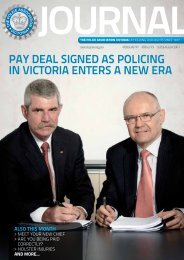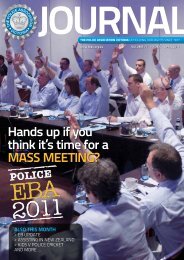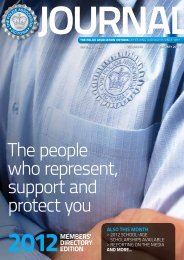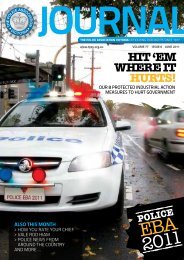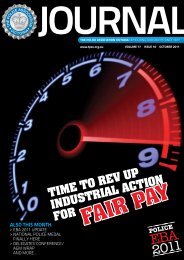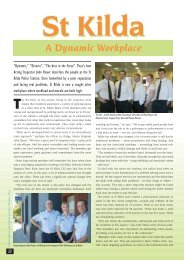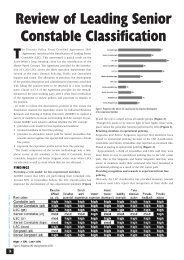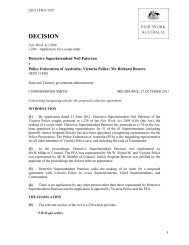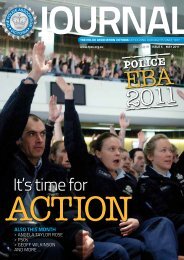August 2009 - The Police Association Victoria
August 2009 - The Police Association Victoria
August 2009 - The Police Association Victoria
Create successful ePaper yourself
Turn your PDF publications into a flip-book with our unique Google optimized e-Paper software.
12<br />
Black Saturday<br />
Who was in charge?<br />
On Black Saturday <strong>2009</strong>, more than 100,000 emergency services staff and volunteers<br />
stood ready to defend the community against Australia’s worst recorded natural disaster.<br />
<strong>The</strong> frightening picture emerging<br />
from the Royal Commission is<br />
that there was no particular<br />
individual in charge.<br />
<strong>The</strong> question about whether<br />
the role of the Country Fire<br />
Authority’s Chief Fire Officer was<br />
to “co-ordinate” or take the lead in<br />
relation to fire warnings on the day<br />
has been well debated in the media<br />
and the commission will make its<br />
finding in due course.<br />
But other submissions have raised<br />
questions about the role of <strong>Victoria</strong>n<br />
police on the day. <strong>The</strong> submission<br />
by Jonathan Beach QC, and others,<br />
on behalf of electricity distributor<br />
SP AusNet, accuses <strong>Victoria</strong> <strong>Police</strong><br />
of abandoning “their responsibility to<br />
warn the public” and of “abdicating<br />
or assigning to others” its statutory<br />
responsibility to monitor the<br />
timeliness of warnings to the public.<br />
SP AusNet said the <strong>Victoria</strong> <strong>Police</strong>’s<br />
failure to release any warnings to<br />
the communities around Kinglake<br />
and Kilmore was “a breach of the<br />
Emergency Management Manual<br />
<strong>Victoria</strong> and therefore a breach of the<br />
Emergency Management Act 1986”.<br />
<strong>The</strong> SP AusNet submission says<br />
the newly-formed Integrated<br />
Emergency Co-ordination Centre<br />
(IECC) was more like a co-location<br />
of the CFA and the Department<br />
of Sustainability on the day of the<br />
fires. But no-one was in charge of<br />
the IECC and there was no common<br />
integrated system between them,<br />
using common information. It was<br />
therefore “dysfunctional”.<br />
<strong>The</strong> submission says<br />
Superintendent Collins was in<br />
charge of the police-run State<br />
Emergency Response Co-ordination<br />
Centre (SERCC) but not in charge<br />
of the IECC. (Rod Collins is an<br />
experienced, professional and<br />
highly regarded police officer of<br />
more than 37 years experience).<br />
<strong>The</strong> IECC did not regard itself as<br />
responsible generally for the issue<br />
of warnings and did not monitor<br />
warnings. <strong>The</strong> <strong>Victoria</strong> <strong>Police</strong> told the<br />
Royal Commission (through Deputy<br />
Commissioner Kieran Walshe) that<br />
they did not regard themselves as the<br />
responsible entity for warnings and<br />
they were not asked to issue warnings.<br />
<strong>The</strong> SP AusNet submission refers<br />
to a guideline on the establishment<br />
of the IECC on a “trial” basis.<br />
Superintendent Collins gave evidence<br />
that one effect of the establishment<br />
of the IECC was to move the<br />
warnings function from police to the<br />
IECC. But the evidence revealed that<br />
the Emergency Management Manual<br />
<strong>Victoria</strong> was not changed and the<br />
IECC guideline was never authorized.<br />
SPAusnet said, “If the <strong>Police</strong> had<br />
abided by their responsibilities as<br />
recorded by the Manual they would<br />
have issued warnings according to the<br />
information the CFA had given them<br />
through Collins at the IECC and through<br />
information flowing from the Kilmore<br />
Incident Control Centre and the Kangaroo<br />
Ground Incident Control Centre. And they<br />
would have ensured that consideration<br />
was being given to alerting the public to<br />
existing and potential danger … either<br />
direct or through the media, and to<br />
the need for evacuation. <strong>The</strong> <strong>Victoria</strong>n<br />
<strong>Police</strong> did none of these things.”<br />
<strong>The</strong> submission says there was a<br />
way to address the dysfunctional<br />
communication between the CFA,<br />
the DSE and <strong>Victoria</strong> <strong>Police</strong>, but<br />
it was not used. SPAusNet said,<br />
“Relevant legislation permits a State<br />
of disaster to be declared. This would<br />
have simplified command lines and<br />
should have occurred on 7 February<br />
<strong>2009</strong>. No-one on 7 February <strong>2009</strong><br />
turned their mind to this.”<br />
It is clear, pursuant to Section 23<br />
of the Emergency Management Act<br />
1986, that the Minister and Chief<br />
Commissioner may advise the<br />
Premier, who may then declare a<br />
State of Disaster. What is not clear<br />
is whether or not the Premier was<br />
advised by either that the situation<br />
on ‘Black Saturday’ was one which<br />
“…constitutes or is likely to constitute a<br />
significant and widespread danger to<br />
life or property in <strong>Victoria</strong>.” (Sec.23[1])<br />
Was he so advised and, if not,<br />
why not? If he was advised, why<br />
was there not a State of Disaster<br />
declared? Wide powers over all<br />
government agencies are conferred<br />
upon the Chief Commissioner once<br />
Sergeant Jon Ellks in Kinglake.<br />
<strong>August</strong> <strong>2009</strong> <strong>The</strong> <strong>Police</strong> <strong>Association</strong> Journal<br />
www.tpav.org.au



